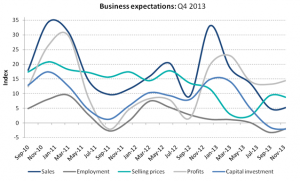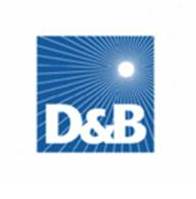After declining through much of the year, initial expectations for the December quarter have steadied as businesses look beyond the federal election, and as the effect of lower interest rates and a lower Australian dollar flow through the economy.
These findings are from Dun & Bradstreet’s latest Business Expectations Survey which shows that 24 per cent of businesses are anticipating increased earnings in the fourth quarter, with the profits index edging up to 14.9 points, compared to 13.2 in the previous quarter.
With the dollar easing to around US 90 cents, a number of industries will be better positioned to control their profit margin. Indicative of this, profit expectations for the manufacturing sector have jumped to 19.9 points, from 1.5 in the previous quarter.
 While businesses expect to see a pick-up in profit levels in the coming months, they remain reluctant to spend, with the capital investment index sliding further into negative territory. Additionally, as businesses seek to stay lean and control costs, hiring new employees remains off the agenda. Although the employment index has arrested its long-term slide, rising from -3.3 points in the previous quarter to -1.3, it remains in negative territory, indicating that more businesses plan to reduce staff than hire.
While businesses expect to see a pick-up in profit levels in the coming months, they remain reluctant to spend, with the capital investment index sliding further into negative territory. Additionally, as businesses seek to stay lean and control costs, hiring new employees remains off the agenda. Although the employment index has arrested its long-term slide, rising from -3.3 points in the previous quarter to -1.3, it remains in negative territory, indicating that more businesses plan to reduce staff than hire.
 According to Gareth Jones, CEO of Dun & Bradstreet, the survey’s findings point to a period of potential stability for the end of the year.
According to Gareth Jones, CEO of Dun & Bradstreet, the survey’s findings point to a period of potential stability for the end of the year.
“It’s fair to say that business owners have had a tough time of it through the first part of this year; battling against high operating costs, poor cash flow and consumers that have generally spurned spending for savings,” said Mr Jones. “Our first look at December quarter expectations, however, hints that operating conditions are stabilising along with a lower Aussie dollar and with expectations of a further interest rate cut to stimulate spending. “While businesses are not intending to increase investment or employment in the months ahead, and although commercial credit growth is weak, business owners are more confident about sales and profits returning.” “As we await a period of sustained economic stability, it may be that the conclusion of the election is the event that kicks these initial findings on sentiment from stable to optimistic,” he added.
According to D&B’s research, 38 per cent of businesses are likely to delay significant business decisions and investments until after the election, suggesting there could be a boost in activity to match the traditional Christmas period lift in consumer spending. Despite the more stable outlook to the December quarter, business expectations remain lower than a year earlier, and there are a number of factors which have the potential to disrupt future growth. According to the Business Expectations Survey, 35 per cent of businesses expect cash flow will be an issue for their operations, while 23 per cent anticipate fuel prices will impact their operations the most. Additionally, with 51 per cent of respondents viewing operational costs as their biggest barrier to growth in the year ahead, careful financial management remains a high priority. Just six per cent of businesses intend to borrow in the December quarter as they seek to avoid additional debt and repayments.
“While the economy is not yet strong, the tentative signs of a bottoming or a moderate upturn in most components of the Business Expectations Survey is encouraging,” said Stephen Koukoulas, Economic Advisor to Dun & Bradstreet.
Source: Dun & Bradstreet Australia – to read the full story click on the link: DB Business Expectations Survey – Dec quarter 2013 – prelim






















